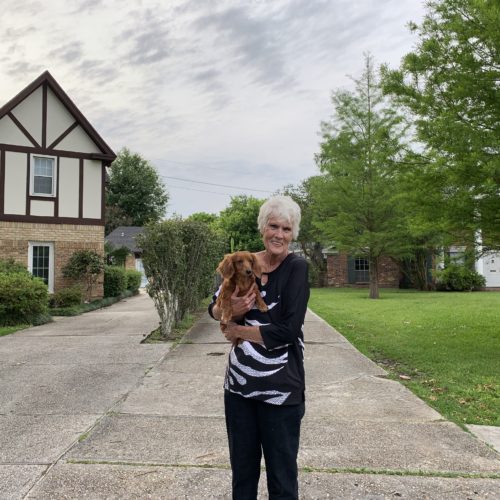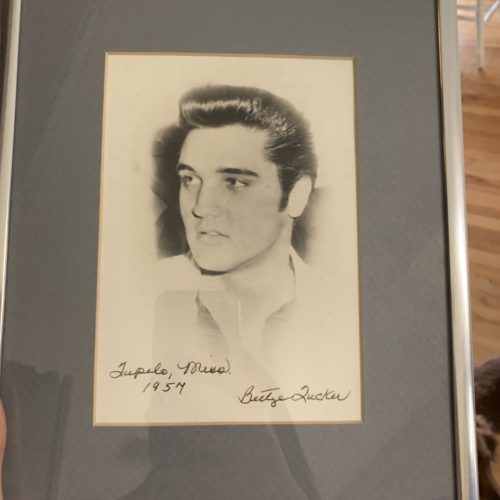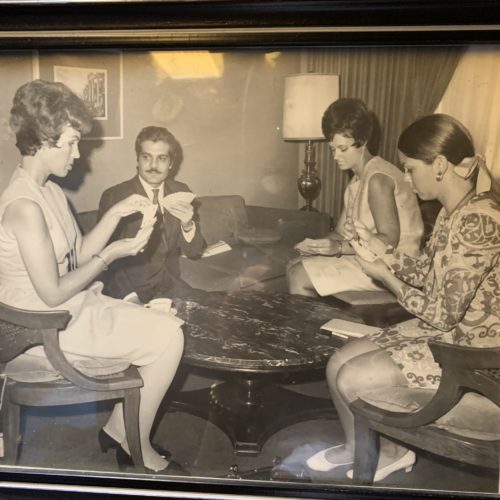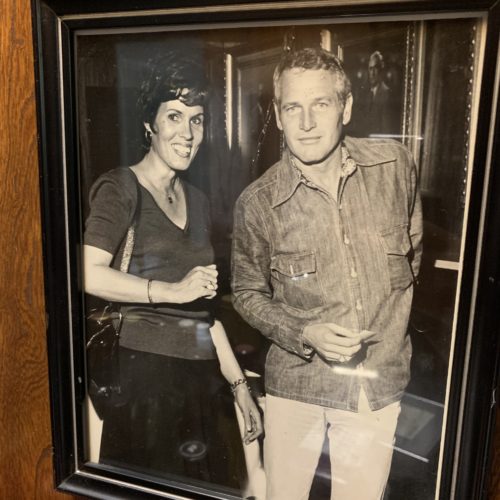Editor’s Note: The following series “Bold Females in the Big Easy” is a week-long series curated by Piper Stevens as part of the Digital Research Internship Program in partnership with ViaNolaVie. The DRI Program is a Newcomb Institute technology initiative for undergraduate students combining technology skillsets, feminist leadership, and the digital humanities.
In celebration of International Woman’s Day, this curation takes a moment to reflect on the powerful women and women-centered movements strengthening our New Orleans community. Bettye Anding was an editor at the Times Picayune for over 30 years. She is a vanguard as far as women in journalism, and she and Mia talk about what it was like to make a spot for herself in the journalism world. This was originally published on August 9, 2019.

Bettye and Heidi Outside her New Orleans Home (Photo by: Mia Royce)
Who: Bettye Anding
What: Bettye was an editor at the Times Picayune for over 30 years. She is a vanguard as far as women in journalism. She interviewed countless celebrities, wrote hundreds of articles, and mentored many female journalists.
A Quotable Quote: “I had an argument with Buzz Aldrin, who was the second man on the moon, because I wanted to interview his wife to see how she felt about her husband being on the moon. He wouldn’t let me, he just, we just squabbled on the street. But I didn’t get to interview her, and they were divorced not long after that. [Mia: So, what did he have to say about the moon?] **Hits the table*** I can’t remember! I just remember the squabble!”
—————————————————————
(middle of interview)
Bettye: Well, ok, I went to work in ’57 in Jackson. I stayed there two years, and then I came to New Orleans — got married and got pregnant. I continued to work, and my father would come up here and get the baby. He didn’t like me working; this was a different time, very different.
In the end, I stayed at home for seven years. I had a little boy and then a little girl two years later. When she was in kindergarten and he was in the second grade, I went back to what was then The Daily News in New Orleans. I worked for 20 years with the Stateside. I decided when I went back to work that I wasn’t going to be a general assignment reporter, because I had to hang out at Charity Hospital and the First District Police Station and the cops were, you know, they would follow you into cars and down the street…
Mia: Really?
Bettye: Oh yeah, they tried to you know… Anyways, so I decided I wanted to do features, and I went into what was then called the ‘Women’s Section,’ and three years later became editor of it. When the papers merged I was the Living Section head.
Mia: What was it like entering the male-driven world of journalism at a time when women were really not present or welcome?
Bettye’s Daughter: Alright let me just interrupt just for a second. Did she tell you that when she wrote for that section it was called the ‘Women Section,’ because it had ‘Women’s’ news. There were a few women who worked in that office, and that was the only place where women worked.
When the women’s liberation movement started, Mom got a bunch of raises because they were writing exposés about women not making as much as their male counterparts.
So the newspaper, since they were printing those stories, thought maybe they needed to do something before someone started pointing the finger at them since they were the ones covering these stories.
Bettye: They called me in three times and gave me big raises and I said, ‘Hey, what’s all this about?” They laughed and said ‘We’ll never tell!’
Bettye’s Daughter: They’ll never tell that the sports editor and all the others are making twice as much as you.
Bettye: Twice.
Bettye’s Daughter: Yeah. I mean when she started working out of college, she was the cute little girl in the office and treated pretty much just like that. Sexual harassment was not considered sexual harassment; it was just considered ‘You’re in the wrong place in the wrong time.’ It’s like ‘You’re here and you’re a female, so we’re gonna talk to you and call you sweetie-pie just like regular.’
Bettye: I knew an editor’s wife that had a baby, and back in those days you had to be in the hospital at least five days. [During that time] he calls me up and asks me to go out. I said “You are a bunch of real shit! Your wife is in there with her new baby and you’re calling me… No! No!’ But anyway, it happened, and it was also maddening when you learned that the men made twice as much as you did.
In that time, in the 50s, to begin with, nobody grabbed you, it was purely um, oral harassment. There was this Sports Editor who used to follow me into this little room all the time, and stand behind me, and put his hands on my shoulders and make remarks you know.
Mia: And still you kept going with journalism?
Bettye: Yeah, and I was the only girl in the newsroom when I went to Jackson, and I got some good stories. They told me I had to be Church editor, and that meant that I had to cover any big story that came up about churches.
So, the first year I was there, this group out west was petitioning the national assembly to let the Black Methodist Churches come to the statewide meetings because it was out west and there weren’t many. So, the Mississippi assembly voted yes to let them come to the meetings out in Utah with the white people. Big deal, right?
Anyways, I wrote a story about this, and this wire editor wrote the title as: “Methodists Vote to Admit Negros.” I just went over there and had a fit.
The next day I went to the meeting, again, and when my taxi stopped, all these preachers ran out and surrounded it yelling at me. And one of them came over and said, ‘Hey you guys! leave her alone! She didn’t write the headline to that story!’ He knew enough about journalism to know that I didn’t write headlines, and he said, ‘Read the story!’ and it’s the facts, you know.
Mia: So how did you get into journalism in the first place?
Bettye: Well, when I was twelve years old or so I used to write novels, and back then we used to have what we called these composition books. I would buy these composition books, and I would write novels in them.
My family moved to Mississippi and at the junior and senior high there, I got to be editor of the newspaper. So, I thought to myself, I could work for a newspaper and write novels in my spare time, and still make money to live.
I discovered, when I started working that I didn’t have the talent for novels because I never liked series or anything — you know, something that you stay with for months. I liked to be in and out of the story.
Well, the editor of the Women’s Section, was going to do this series on abortion, six parts. This was around ’58. Well, Betsy, the editor, got another job in San Francisco and told me I had to finish the series…
And it won an award that year.
Mia: What are some themes that tend to draw you into a story? Or was it mainly just assignments that you were given?
Bettye: I had my own stories. I had my own ideas and walked up and said, ‘Why don’t we do a story on this or that?’ I liked entertainment a lot, and so the entertainment editors in Jackson and in New Orleans used me when they needed a movie or a play covered. And I met all sorts of people that way. I can’t begin to tell you the people I’ve met. Come here I’ll show you something.
***LEADS US TO PHOTOS****

Elvis By Bettye

“Playing” Bridge with Omar Sharif (Bettye on left)

Bettye and Paul Newman
Alright so this is the picture of, this is the picture I took of Elvis.
Mia: That’s the picture you took? You were this close?
Bettye: Yes. Oh, and here’s Paul Newman and me. And here’s Omar Sharif and me and two other women from the New Orleans paper. We are playing Bridge because he came here for a Bridge tournament. I can’t play Bridge, so I had to fake it. I just held my cards, and faked it.
Mia: Was being a journalist in the 50s and 60s, was pretty social would you say?
Bettye: Yes. I interviewed, the crew of a spaceship that had run into trouble, its Apollo something.
I interviewed a guy in an Iron Lung who had gotten polio when he was supposed to have been inoculated. They flew him to the hospital and put him in an Iron Lung, and I interviewed him in the iron lung.
I interviewed John Wayne, he came down with this other guy, they had done this movie. And Mahalia Jackson, which was a story everybody liked, and she asked me, in the middle of the interview ‘Why don’t you people like us?’ And I have never forgotten that.
Mia: And how’d you respond?
Bettye: I don’t know… [Laughing].
And the I interviewed Ella Fitzgerald. I did mostly feature stories. Oh, I had an argument with Buzz Aldrin, who was the second man on the moon, because I wanted to interview his wife to see how she felt about her husband being on the moon. He wouldn’t let me, he just, we just squabbled on the street. But I didn’t get to interview her, and they were divorced not long after that.
Mia: S0, what did he have to say about the moon?
Bettye: **Hits the table*** I can’t remember! I just remember the squabble!
Mia: So how did you get to all these celebrities? They just trusted you with you with these assignments?
Bettye: Some of it came through the entertainment editor who would say, ‘Look, Ella Fitzgerald is here, and I’m going off to interview somebody else, so you take it.’
Mia: When you’re following your subjects, do you take notes, and are there ways for journalists to not be so invasive when they gather information?
Bettye: Well you take notes, obviously, and I think at some point in my career we got the ability to tape our interviews. I think I was an editor at that time. In the field, it was scribble, scribble, scribble.
Mia: Did you get to write your own questions?
Bettye: Oh yeah, they don’t tell you what to ask. In fact, you have to kind of figure it out. I didn’t get told very much about the subject until I was sent out.
Sometime, if you have an interview made in advance you can look up information, but I didn’t always have enough time to go to the library and look up information on the stories or people. Sometimes the editor calls you over and the photographer is standing right there waiting for you, saying you have to go over there to blah blah blah.
Mia: What were some low points of your career?”
Bettye: The low points of my career were at the very end, as I got older and the people coming in had new ideas; there was some friction.
I can look at the paper today and tell you the stories are horribly written. You have to read at least five inches of story before you know what its about. They give you the lead, and they give you what they call color, and they give you too much color… I mean you don’t want an anecdote about something that happened 50 years ago and then go into the story. You want the story. And these are not features, some of them are news stories, and I don’t think they’re very good.
Mia: How do you define “alternative,” and how do you see your work fitting (or not fitting) your definition?
Bettye: Oh gosh…Alternative journalism…I don’t… It doesn’t come to me… What is it?
Mia: I guess, hmm, I would say that your journalism is alternative especially for the time period where you were essentially one of the only women in the industry. Do you think you have a unique perspective on stories, a female perspective, where all the other stories are written by men? Would you say you have unique angles?
Bettye: Yeah, I would.
Mia: Especially when you’re interviewing other women, you probably can get a better story out of them than if they were talking to a man.
Bettye: Yeah, sometimes… But I don’t even understand the use of alternative there. One time my mother said to me, ‘Bettye, do you have any men working for you?’ and I said, ‘Yes,’ and she said ‘Gasp, Bettye’s got men working for her!!’
Mia: That sounds alternative to me. And badass.
This interview was completed for the class Alternative Journalism, a class at Tulane University taught by Kelley Crawford. The interview has been edited and configured for publication.
 NOLAbeings Multimedia artist Claire Bangser created NOLAbeings as a portrait-based story project that marries...
NOLAbeings Multimedia artist Claire Bangser created NOLAbeings as a portrait-based story project that marries...  Voodoo in New Orleans: Reviving history: New Orleans fortune telling This article takes a deep dive into the history of Voodoo in New Orleans, its hybridization with Catholicism, and its present-day place in the city's culture. The author visits fortune-tellers in the French Quarter, using their guidance as a tool for introspection rather than a deterministic predictor of the future. Through her experiences in New Orleans, the author feels a mystical connection to both the past and the future.
Voodoo in New Orleans: Reviving history: New Orleans fortune telling This article takes a deep dive into the history of Voodoo in New Orleans, its hybridization with Catholicism, and its present-day place in the city's culture. The author visits fortune-tellers in the French Quarter, using their guidance as a tool for introspection rather than a deterministic predictor of the future. Through her experiences in New Orleans, the author feels a mystical connection to both the past and the future. 
[…] years ago, in an interview for ViaNolaVie, former Times-Picayune features editor Bettye Anding rolled out a wide-ranging array […]